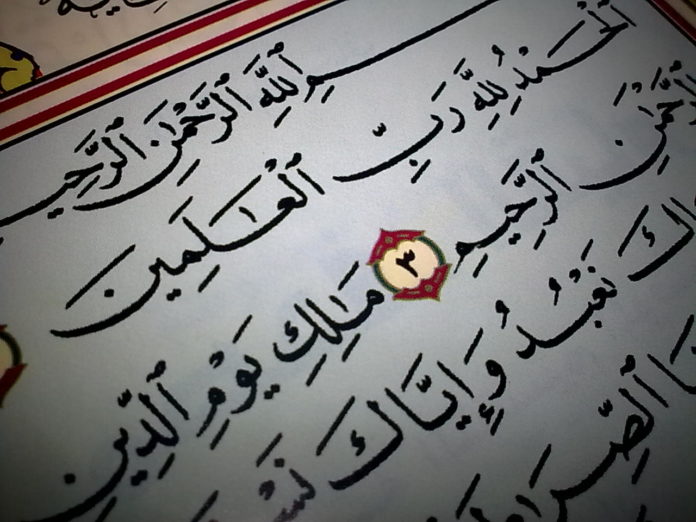The saying of the Exalted, “The Most Beneficent (ar-Rahmaan), The Most Merciful (ar-Raheem)”:
These are two descriptions of Allah the Exalted and two of the Names from amongst His Beautiful Names derived from ar-Rahma (Mercy) in a way to express intense and exaggerated meanings.
Ar-Rahmaan is more intense than ar-Raheem because Ar-Rahmaan is the one endowed with Mercy that extends to all of the creations in this world and to the believers in the Hereafter. Ar-Raheem on the other hand is the One endowed with Mercy that extends to only the believers on the Day of Judgement – this being the understanding of the majority of the scholars. From the discussion of ibn Jareer [at-Tabaree] one can understand that there is an agreement on this and the commentary of some of the Salaf lends weight to this understanding as was stated by ibn Katheer. The narration reported from Eesa, as mentioned by ibn Katheer and others, also indicates this – that he (upon him and our Prophet be peace and blessings) said,
Ar-Rahmaan: the One Who shows Mercy in this world and the Hereafter. Ar-Raheem: the One Who shows Mercy in the Hereafter. [1]
Allah the Exalted also points to what we have mentioned when He said,
| ‘Then He rose over the Throne, ar-Rahmaan’ [Al-Furqaan (25): 59]
‘Ar-Rahmaan rose over the Throne.’ [Taa Haa (20): 5] |
| ‘Do they not see the birds above them, spreading out their wings and folding them in? None upholds them except ar-Rahmaan’ [Al-Mulk (67): 19] |
meaning: from his Mercy to His creation is his kindness to the birds and His holding them in the sky while they are spreading out their wings and folding them in. And from the clearest evidences pertaining to this is His saying,
| ‘Ar-Rahmaan. He taught the Qur`aan…so which of the favours of your Lord will you two deny?’ [Ar-Rahmaan (55): 1-13] |
And He said,
| ‘And He is Ever Most Merciful (Raheem) to the believers’ [Al-Ahzaab (33): 43] |
and hence particularised His name ar-Raheem to them. So if it asked: ‘how is it possible to reconcile what you have thusfar established with his ﷺ saying in the supplication,
‘The Rahmaan of the world and the Hereafter and the Raheem of them’? [2]
The obvious reply – and Allah knows best – is that ar-Raheem is specific to the believers as we have mentioned, but it is not specified to them in the Hereafter alone, rather His Mercy to them is included in this world as well. So the meaning of ‘the Raheem of them’ would be ‘His Mercy to the believers in them’. And the evidence that He is Raheem to the believers in this world as well [as the Hereafter] is that this is the literal meaning of His, the Exalted’s saying,
| ‘He is the One who sends His Blessings (salaah) upon you, and His Angels so as to lead you out of the darkness to the light, and He is Ever Most Merciful (Raheem) to the believers.’ [Al-Ahzaab (33): 43] |
Because His salaah upon them, the salaah of His Angels and His leading them out of the darkness to the light is Mercy to them in this world, even though it be the reason for Mercy in the Hereafter as well. And similar to this in meaning is His saying,
| ‘Allah has forgiven the Prophet, the Muhaajiroon and the Ansaar who followed him in the time of distress after the hearts of a group of them had nearly deviated [from the Right Path], but He accepted their repentance. Certainly He is Full of Kindness to them, Most Merciful (Raheem).’ [At-Tawbah (9): 117] |
For the Mercy is linked to the event that befell the Prophet, the Muhaajiroon and the Ansaar, and also His forgiving them was Mercy in this world even though it be the reason for Mercy in the Hereafter as well. The Knowledge [of what is correct] lies with Allah. [3]
In Allah’s mentioning His Names, ar-Rahmaan and ar-Raheem, after mentioning ‘Lord of the Universe’ lies an example of encouragement following admonition such that the servant combines in himself a sense of dread as well as hope. Examples of this method are abundant in the Qur`aan and Sunnah. For example His sayings,
| “Inform My servants that it is I Who is the Forgiving, the Merciful and that it is My punishment that is the painful torment.” [Al-Hijr (15): 49-50]
“The forgiver of sin, acceptor of repentance, severe in punishment, owner of abundance.” [Ghaafir (40): 3] |
| If the believers knew of the punishment of Allah then none would hope to attain His Paradise. If the disbelievers knew the full extent of the Mercy of Allah then none would despair of entering His Mercy. [4] |
Footnotes
{1}
{2} Reported by al-Haakim [1/515] and he declared it saheeh. However adh-Dhahabee criticised this by saying, “al-Hakam [its narrator] is not trustworthy and precise.” Al-Mundhiree said about this isnaad in ‘Targheeb wat Tarheeb’ [2/616], “al-Hakm is abandoned, accused.” Refer to Muqbil bin Haadee, ‘Takhreej `alaa Tafseer ibn Katheer’ [1/43]
{3} The above discussion is taken entirely from ash-Shanqeetee, ‘Adwaa al-Bayaan’ [1/31-32]
{4} Saheeh Muslim [Eng. Trans. 4/1438 no. 6636]
(NOTE: If you want to build a strong and powerful relationship with Allah, check out Islamia TV, where you can watch Islamic speakers from across the globe deliver inspiring and motivational courses. Learn more at www.islamia.tv.)

SUBSCRIBE AND LEARN...
- Fresh articles
- Increase your Islamic knowledge
- Build a Powerful Connection with Allah

















































